In Japanese, torogao トロ顔 is an NSFW term meaning "drowsy face." It's often mistranslated and misinterpreted as "melting face," in particular in the meme know your gaos.
A torogao is a facial expression of (sexual) pleasure with eyes heavy, half-closed, implying the character is intoxicated or lethargic, robbed of their strength by something that felt too good.
The words "drowsy" and "groggy" are terms for such state in English, although they typically refer to sleepiness. I can't find a better word for this, so I guess torogao translates to "drowsy face."
- Context: food is delicious.
- kan'in 完飲
Drinking it all. (in this case, ramen.)
This term was featured in the meme template know your gaos.
What torogao Means
The term torogao トロ顔 comes from torotoro トロトロ, which means "to feel drowsy," among other things, and word kao 顔, "face," that becomes gao 顔 due to rendaku.
- torotoro
とろとろ
For a solid to melt, such that it become "sticky," "gooey."
Losing force. For a fire to weaken. For a train to slow down.
To feel sleepy. Drowsy. Groggy.- This is a mimetic word.
- All usages of torotoro imply losing strength.
- By the way, dorodoro どろどろ means viscous like mud.
- me ga toron to suru
目がトロンとする
(For someone's) eyes to be "toron." (literally.)
(For someone's) eyes to be [heavy].
"Melting Face"
The term torogao is often mistranslated as "melting face," as in a face of "melting" pleasure.
It's also mistakenly interpreted this way in Japanese, because the Japanese word for "to melt" happens to start with toro:
- torokeru
蕩ける
To melt.
Therefore the right word would be:
- torokegao
蕩け顔
Melting face.
You could say that torogao is a type of torokegao, but not every torokegao is a torogao. If a character is "melting" in pleasure but their eyes are wide open or completely closed, for example, that's clearly different from the definition of torogao.
In other words, "melting" is too broad, torogao is a lot more specific.
- Here, we see Rista melting, drooling and nosebleeding from her own perverted mind..
Examples of torogao
As one would expect, torogao is mostly a pornographic term, so you'll rarely find instances of it in your normal, regular TV anime.
Anime: Nisemonogatari 偽物語 (Episode 8)
- ha-migaki purei
歯磨きプレイ
Tooth-brushing play.- ha-burashi
歯ブラシ
Toothbrush. - migaku
磨く
To polish.
To brush [teeth].
- ha-burashi
Except sometimes it's used as a joke:
- Context: stop making weird sounds!
- datte kore... sugoku' kimochi...' yokutteeee♥
だってこれ・・・すごくっ気持ち・・・っよくってぇぇぇ♥
[It's because] this... [it] feels very good...♥- kimochi-ii
気持ちいい
To feel good.
- kimochi-ii
- The shirt reads sugoi dekai, meaning "incredible big." It has improper grammar. The correct is sugoku dekai, with the i-adjective inflected to the ren'youkei 連用形.
- massaaji chea ni swautte-iru dake desu
※マッサージチェアに座っているだけです
[She] is just sitting in a massage chair. - biku' biku'
ビクッビクッ
*twitch twitch* - vu vu vu vu
ヴヴヴヴ
In fact, it's easier to find an example of this case from a character "drowsy" in the sense of falling asleep.
Anime: Lucky☆Star, らき☆すた (Episode 4)
- Since this has nothing to do with pleasure, it doesn't count as torogao, even though it's drawn pretty much the same way as torogao.
Note that eyes half-closed in general are called han-me 半目. When those half-closed eyes are staring at someone, typically judgingly, they're called jito-me ジト目.
Anime: Koutetsujou no Kabaneri 甲鉄城のカバネリ (Episode 4)
References
- トロ顔 - dic.pixiv.net, accessed 2019-05-03.
- とろとろ - kotobank.jp, accessed 2020-05-27.
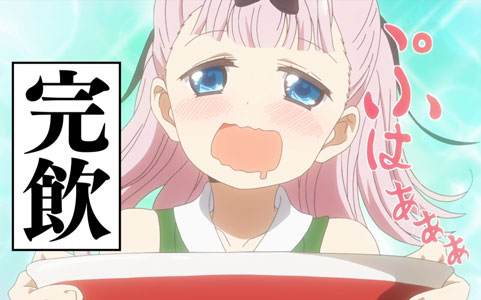
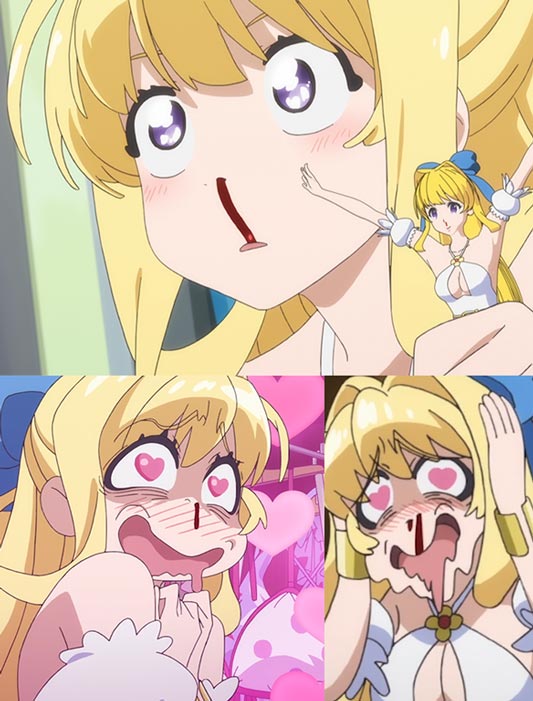
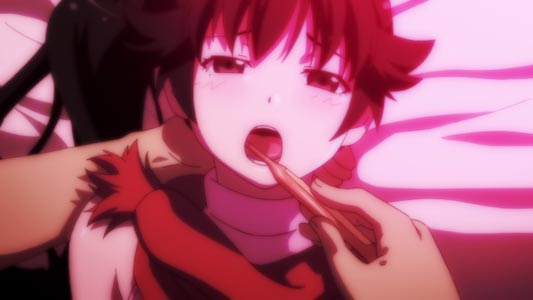
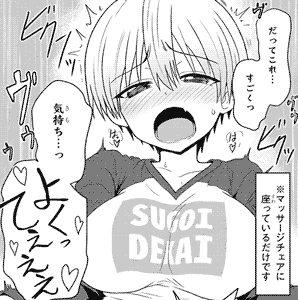
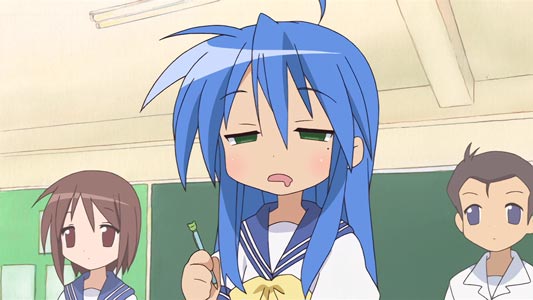
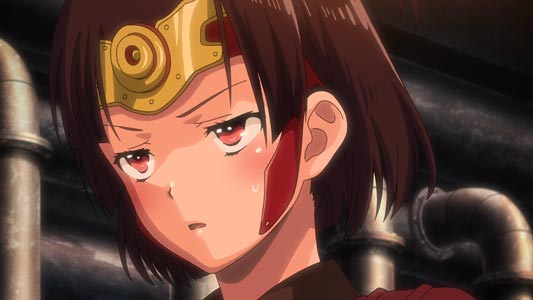
No comments: